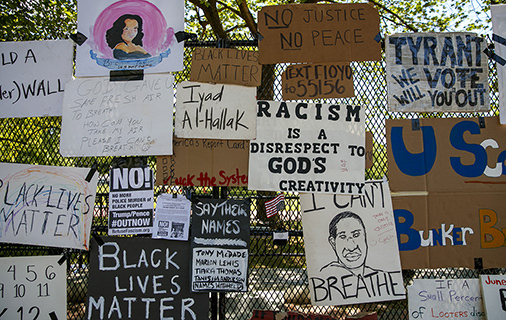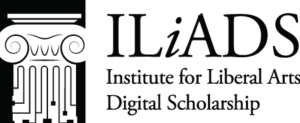
Number 135 May/June 2020
ISSN 1944-7639 (online version)
Contents
Resources for Diversity, Equity, and Inclusion
Recordings at Risk Call for Proposals Opens November 2020
CLIR Issues is produced in electronic format only. To receive the newsletter, please sign up at https://www.clir.org/pubs/issues/signup. Content is not copyrighted and can be freely distributed.
Follow us on Twitter @CLIRNews, @CLIRHC, @CLIRRaR@CLIRDLF
Like us on Facebook @CLIRNews
A Disquieting Innocence
—By Charles Henry
This innocent country set you down in a ghetto in which, in fact, it intended that you should perish. Let me spell out precisely what I mean by that for the heart of the matter is here and the crux of my dispute with my country. You were born where you were born and faced the future that you faced because you were black and for no other reason. The limits to your ambition were thus expected to be settled. You were born into a society which spelled out with brutal clarity and in as many ways as possible that you were a worthless human being. You were not expected to aspire to excellence. You were expected to make peace with mediocrity.
The quote above is from the essay “My Dungeon Shook—Letter to My Nephew on the 100th Anniversary of Emancipation,” in James Baldwin’s 1963 collection, The Fire Next Time. Baldwin’s letter to his namesake nephew has a painfully familiar relevance today in light of the demonstrations across America in response to decades of racial oppression, the loss of black lives at the hands of police—most recently the murder of George Floyd, but our graveyards tragically attest to so many Black Americans similarly cut down by an almost casual injustice—fanned and abetted by the bigotry of prominent leaders in government.
Like most of Baldwin’s writing, the letter to his nephew is unadorned, searing, and unequivocal. The world he grew up in is essentially the world his nephew inherited, so the elder uncle can attest to the pain, sorrow, and insult of pervasive racism that dehumanizes without respect to any generational divide. He continues:
They [the racists] are in effect still trapped in a history they do not understand and until they understand it, they cannot be released from it…But these are your brothers, your lost younger brothers, and if the word ‘integration’ means anything, this is what it means: that we with love shall force our brothers to see themselves as they are, to cease fleeing from reality and begin to change it, for this is your home, my friend.
The term innocent is salient in this essay and in Baldwin’s writing in general. It does not, I believe, define a guiltless or naïve character. Quite the contrary: it is a soul-burning adjective that conveys an unwillingness of the nation and the majority of the people living in it to take responsibility for their actions, an inability to enter into a new, more equitable social contract, and by so refusing causes the devastation of others’ lives. It is, as depicted earlier in the letter, living without seeing or understanding one’s true history. An aspect of forcing these lost brothers to see themselves as they are is to help them realize the true narrative of their destructive root causes. The past, when seen through this kind of innocence, is devoid of truth and consequence that can in turn foster misprision and wrenching suffering. Ahistorical time recurs irresponsibly, indifferently.

But today there is promise alongside the pain in our streets, in the United States and around the world. The fire this time is both a reckoning and an awakening, a global voice united in protesting the crippling ignorance and culpable innocence that James Baldwin decried. Because engagement with history is essential to our freedom, it is a propitious time to reflect upon the fundamental work of our communities: libraries, archives, museums, and galleries, the composite of memory institutions in service to the public good. We are conversant and critical with the past as a professional mandate, and insist on its preservation, documentation, contextualization, discovery, and reuse both to inform the present and help envision a more charitable future.
While the spotlight will always focus on the broader strokes and dramatic unfolding of current events, it is vital to acknowledge the work of tens of thousands of our colleagues—in particular the vital work of Black and other POC memory workers—who continue to augment this cultural discourse, who strive to assure that this knowledge is made available in an agnostic, unbiased way. This work has been ongoing for centuries, and is not new, but must be foregrounded now as the assault on truth, literacy, science, and accuracy has metastasized to the point of engendering worldwide protest against such lethal innocence.
From our communities, contributions small and large, fleeting and longer term, help us see ourselves and our world through the complexity, nuance, and shadings that exemplify our nature. These contributions might include a well-reasoned answer to a reference question; an accurate metadata scheme; an open repository of well-curated data; a challenging museum exhibit on an overlooked or often misunderstood aspect of history; or persistent diligence to preserve and make accessible marginalized voices.
Collectively, we work on a shared canvas. This work is predicated on the necessity of confronting and rigorously exploring our legacy, not fleeing from it, to build and rebuild a welcoming habitation that is equitable and just. We will persist, for this is our home.
Resources for Diversity, Equity, and Inclusion
The DLF Committee for Equity and Inclusion, a working group focused on year-round as well as event-specific inclusivity initiatives, has assembled a list of readings and resources covering topics from implicit bias to gender inclusion, race in librarianship and academia, and DEI in labor practices. The list is a living, continually-updated document, and the group welcomes new suggestions as well as new attendees at the standing committee meetings. Learn more about the committee, join the Google group for opportunities for further discussion, or participate in monthly virtual meetings (second Tuesdays at 2:30pm ET).
CLIR to Serve as Fiscal Host for ILiADS
CLIR has signed an agreement with the Institute for Liberal Arts Digital Scholarship (ILiADS) to serve as its fiscal host. ILiADS is a network of individuals, expertise, and projects that demonstrate the scholarly and pedagogical impact of the digital liberal arts.
 Launched at Hamilton College in 2015, with initial funding from The Andrew W. Mellon Foundation, ILiADS began as a collaboration among a few liberal arts colleges and universities. Each year, ILiADS offers a weeklong institute for intensive collaboration among project teams comprising researchers, librarians, technologists, and students. Teams build upon established digital pedagogy or scholarship projects, or launch new ones. To date, more than 40 institutions have sent 60 teams to the institute, which is supported by a network of institutional sponsors.
Launched at Hamilton College in 2015, with initial funding from The Andrew W. Mellon Foundation, ILiADS began as a collaboration among a few liberal arts colleges and universities. Each year, ILiADS offers a weeklong institute for intensive collaboration among project teams comprising researchers, librarians, technologists, and students. Teams build upon established digital pedagogy or scholarship projects, or launch new ones. To date, more than 40 institutions have sent 60 teams to the institute, which is supported by a network of institutional sponsors.
As fiscal host, CLIR will manage banking for the organization and will be responsible for processing payments, accounting, and financial reporting. ILiADS will remain independent and be responsible for communicating with its academic partners, sponsors, and steering committee, and for managing the annual institutes.
“This is a tremendous opportunity for ILiADS,” said Megan Kudzia, digital scholarship librarian at Michigan State University and chair of ILiADS’ steering committee. “We expect our new relationship with CLIR to provide stability for the organization by making it significantly easier to host each summer’s institute. We are also excited about the increased level of transparency we will be able to offer the ILiADS community and our Academic Partners regarding ILiADS’ fiscal situation. We are delighted to be joining the community of CLIR affiliates.”
In recent years, CLIR has entered into similar arrangements, called affiliations, with other organizations. CLIR currently serves as fiscal or administrative host for code4lib, International Image Interoperability Framework, International Internet Preservation Consortium, National Digital Stewardship Alliance, and Open Repositories, in addition to ILiADS.
DLF at 25: Program Review and Webinar Recording Available
On May 20, CLIR president Charles Henry and CLIR Board member Carol Mandel joined Joanne Kossuth, founding director of 1MountainRoad consultancy, in a webinar to discuss the findings of a yearlong program review of the Digital Library Federation (DLF). Kossuth’s review draws on hundreds of responses collected from interviews and written exchanges with CLIR and DLF staff, representatives of member institutions, DLF advisory committee committee and working group members, and Forum participants.
An immediate outcome of the review has been a reorganization at CLIR to facilitate closer collaboration between CLIR and DLF. “It was through this report that the interest and engagement of the DLF community with CLIR, and CLIR’s further engagement with DLF was considered a priority,” said Henry. In the new organizational chart, DLF now falls within the Cultural Networks and Knowledge Systems Division, along with initiatives such as the Digital Library of the Middle East and Pangia.
A search is currently under way for a senior program officer to lead the DLF, with an announcement expected by late fall.
Recordings at Risk Call for Proposals Opens November 2020
CLIR will begin accepting applications for its eighth Recordings at Risk grant cycle beginning November 2, 2020. Applications will be due January 29, 2021. We don’t anticipate significant changes to the application guidelines for the next cycle, so applicants may consult the Cycle 7 guidelines and template to begin drafting proposals. Be sure to reference Cycle 8 materials once they are posted.
In May, CLIR announced the latest round of Recordings at Risk recipients. More than $650,000 was awarded to 20 projects.

